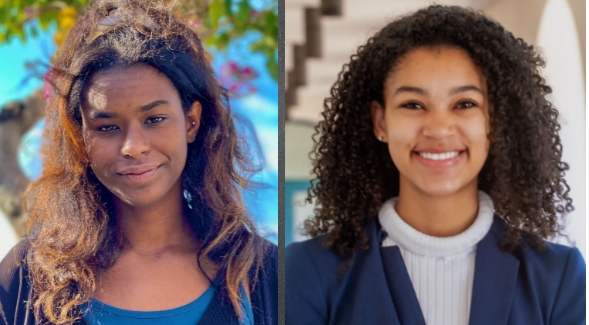Henrietta Goodwin Scholars Program Inspires Graduates to Continue Education
Azure Fisher and Alexia Oduro are among the first Henrietta Goodwin Scholars to continue their education at graduate school.

“The Henrietta Goodwin Scholars program made all the difference to me and is the reason I am able to graduate early and am going to grad school,” said Azure Fisher, who graduates this month with a bachelor’s degree in sustainability. After completing just two years at San Diego State University, Fisher has secured a spot at California State University Dominguez Hills to work toward a master’s in environmental science.
Fisher attributes her achievements and success to the support received as a Henrietta Goodwin Scholar (HGS) at SDSU, and credits professor Tonika Green and mentor and academic coach Cristian “CJ” Johnson with making her feel welcome emotionally and encouraging her academically.
“HGS gave me a sense of community and belonging. The program allowed me to make connections, to complete research, talk to people in fields that interested me, and apply to graduate school,” Fisher said.
Fisher is one of the first Henrietta Goodwin Scholar students to be accepted into a graduate school program and continue their education since the program began.
“These students embody the vision of what the Henrietta Goodwin Scholars program is all about and it speaks to the legacy of Henrietta Goodwin,” said Green, associate vice president for campus community affairs.
Green said the students “are phenomenal in their own right,” and that they benefit from support from the Black Resource Center (BRC), HGS for first years led by BRC director, Brandon Gamble and newly appointed faculty scholar Rachael Stewart and HGS 2.0 for sophomores, led by Ahliyah Chambers, the BRC’s assistant director.
Posed to Make a Change
Raised in Ladera Heights, a predominantly Black area of Los Angeles that is home to numerous oil rigs, Fisher has experienced the impacts and health disparities from drilling near homes. A number of people in her community are currently experiencing environmental health impacts they believe to be due to the drilling, the most severe being cancer. These experiences inspired Fisher to dig deeper into how structural racism is impacting health care.
Fisher hopes to combine her personal experiences and knowledge of sustainability with what she will learn at CSU Dominguez Hills in environmental science to combat these disparities.
“I became interested in this subject due to environmental racism that is in my community and several other minority communities in America,” Fisher said. “I hope to pursue environmental consulting and continue research, especially environmental research with a focus on local minority communities. My dream job would be to continue the research in environmental racism and make a genuine impact on marginalized communities.”
Although her time on campus was shorter than the average student’s, Fisher encourages all students to find their community.
“I would encourage every Black student to join the HGS program and to participate in the activities that the Black Resource Center hosts in general,” Fisher said. “Everyone is so welcoming, even if you come alone and do not know anyone. The program provides mentorship for what each student needs specifically and each individual is celebrated and encouraged within their own journey, which is what really stood out to me in the program.”
The Program’s Many “Gifts”
Also graduating this semester and continuing on to graduate school after being a Henrietta Goodwin Scholar is Alexia Oduro.
“My favorite part of being involved in HGS was how they helped me in my journey with my own Black identity,” said Oduro. “I went from feeling isolated, being one of the only Black students in my classes, to feeling excited that I was able to represent my Black community in my classes. The Henrietta Goodwin Scholars program and faculty and staff helped me find my individual voice, which is a priceless gift.”
At the age of 10, Oduro spent time with a young child who was diagnosed with a severe disability. That experience inspired her passion and interest in speech-language pathology. Now, a third-year senior, set to cross the stage and receive a bachelor’s degree in Speech, Language, and Hearing Sciences, Oduro is committed to continuing her education and efforts.
“My goal is to graduate with a master’s degree in speech-language pathology and become a speech pathologist in the school system,” Oduro said. “However, since being in the Henrietta Goodwin Scholars program and from my time spent with staff and faculty at SDSU, my dream has grown even bigger into contributing in advocacy in diversity, equity and inclusion in the entire field and, eventually, higher education.”
Oduro will remain at SDSU and work toward a master’s in speech-language pathology.
“The Henrietta Goodwin Scholars program definitely had an impact on my applying for graduate school. In fact, Henrietta Goodwin Scholars was the first to even introduce the concept of grad school to me. I may not have even thought that I could achieve it, otherwise.”
History of the Henrietta Goodwin Scholars Program
Named for the first Black student to graduate from what was then the San Diego Normal School, the Henrietta Goodwin Scholars program was founded in 2019 and is housed within the BRC. Students in the program receive academic support, community engagement and personal and professional development. They are also connected to Black faculty and staff who serve as mentors and have access to peer mentors, tutoring and other resources, receive invitations to cultural activities and also access research and leadership opportunities.
Henrietta Goodwin Scholars are enrolled in a number of courses designed to provide an academic learning environment where they feel safe and supported and can be successful including courses in collaboration with the Department of Africana Studies. These courses also satisfy various general education requirements ensuring these students are on the path to graduation.
More information on the Henrietta Goodwin Scholars program can be found online.



